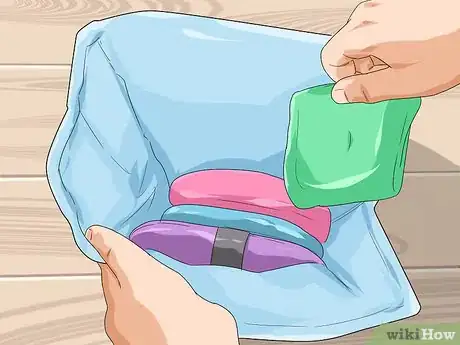This article was co-authored by Ashley Pritchard, MA. Ashley Pritchard is an Academic and School Counselor at Delaware Valley Regional High School in Frenchtown, New Jersey. Ashley has over 3 years of high school, college, and career counseling experience. She has an MA in School Counseling with a specialization in Mental Health from Caldwell University and is certified as an Independent Education Consultant through the University of California, Irvine.
wikiHow marks an article as reader-approved once it receives enough positive feedback. In this case, 89% of readers who voted found the article helpful, earning it our reader-approved status.
This article has been viewed 110,257 times.
After a few months away, preparations for a new school year can be overwhelming and intimidating. Whether you spent the summer relaxing or working, the transition to the regular routine of the school week can be a challenge. Some adjustments to your personal habits, mental preparation, and simple organization of your supplies can boost your confidence as you start the year ahead.
Steps
Preparing Mentally
-
1Review what you learned last year. You don’t have to study for long hours. This can be as simple as reviewing the subjects that you studied and skimming summaries of the books that you read last year. A quick refresher will get your mind ready for studying and make the first weeks back easier as you can see them as a continuation of progress that you have made.
- Reread your notes. Your class notes will remind you of the material you covered previously, as well as your initial reactions to the material. Do not worry if you don’t fully understand all of the concepts that you review: reexamining and rediscovering specific ideas is a natural part of the learning process.
- Make a list of what you have learned. If you did not take notes, or did not save them, try a more active approach and list the subjects that you studied the previous year. Look at a report card or transcript if you need. Then, list major lessons and ideas that were covered beneath each subject. You likely cannot remember everything, but the act of recalling previous progress will get your mind ready for mental work.
-
2Look ahead. Get a list of what you will be studying in your classes and get a sense for what you will be learning. You don’t have to work ahead if you don’t want. Simply having a sense for what you will be covering will prepare you for success.
- You may not be given a syllabus or required book list in advance. Some teachers and schools will be happy to supply this information if you ask. Others may not be willing or able to supply this information. Ask politely and be gracious if denied.
Advertisement -
3Set specific goals. If you want to get straight A’s, you can develop a study routine with time dedicated to each class before the year starts. If there is a specific subject that you want to excel in, check out introductory books from your local library. If you want to focus on making friends, explore your school’s clubs and activities to find an interesting option that fits your schedule. These are not mutually exclusive goals, but it will help if you know what is most important to you.
-
4Pick a study space. A good study space will mean different things for different people, and it can change from year to year. As the school year approaches, many news outlets suggest ideas for creating an effective study space.[1] Pick a study space that is conducive to your goals. If you want to master a complicated subject, you may need to study in a library so that you can access relevant books. If you want to make new friends, look for a café where you can talk with other customers while studying.
-
5Acknowledge your typical distractions. If you can, eliminate distractions in your work space or during set times. If you find it hard to ignore a television, find a suitable study space with no televisions in sight. If noise distracts you, look for a desk in a quiet corner of the library or purchase noise-cancelling headphones.
Organizing Your School Supplies
-
1Purchase all required supplies. Your school may provide a list of materials that you will need, or you may need to make your own list of the supplies that you will need. Major retailers like Target and Walmart, as well as pharmacies like Walgreens and CVS, typically run promotional sales during the weeks leading up to the school year: you can often get all of the supplies that you need in one stop.[2]
- Plan ahead. While stores usually advertise back-to-school sales, some items may be cheaper during other sales. For example, clothing may be cheaper during end-of-summer clearance sales held before the back-to-school sales. Get your list ready in advance, and look for deals throughout the summer.[3]
- Check for additional student discounts. Keep your student ID handy as some retailers offer discounts if you can show that you are a student. Ask a salesperson or look online for a list of major retailers with discounts.[4]
-
2Pack your school bag. Get your supplies ready in advance so that you will have a chance to double check that you have everything. Make sure that your bag is large enough to carry the items that you will need daily. Use the sections of your backpack or organizational supplies to make all of your supplies easily accessible.
- Make sure you have folders to collect loose papers and assignments. You might lose important information or undermine your success by turning in damaged work.
- Plan to have extras of the most essential items. It is easy to lose a pencil before an important test, so have several writing utensils stashed in your bag.
-
3Pack a special bag for crisis items. Pack a small bag or a compartment in your backpack with items that can help in emergencies. For example, a pack of tissues can be ready in case you get a runny nose in class and a bandage can help if you get a papercut while reaching into your bag. Try to buy mini sizes so that you don't take up a lot of space in your school bag.
- Some items that might help you in a pinch: a pack of gum or breath spray, lip balm, a few adhesive bandages, a packet of tissues, antibacterial gel, oil blotting sheets, a compact mirror and makeup, sanitary pads/tampons, tweezers.[5]
- Try not to advertise your preparation as other students may take advantage of your foresight and ask to use your supplies. If you aren’t careful, you'll eventually be left with nothing. If people are pestering you for gum, try carrying an empty gum packet as evidence that you're chewing your last piece.
- Keep your essential items separate from your books or they may break in your bag. They may even leak and ruin your books if not kept in an individual pouch or bag.
-
4Check your pockets. Make sure that you have enough space for the items you plan on carrying with you daily. You will want to keep necessities like your phone, headphones, a bus pass, and keys nearby for safe keeping and so that you don't have to spend too much time hunting for them when needed. If you wear a blazer, or have front pockets in your bag, you can use them for small items that could get lost in a bigger pouch
Establishing a Routine
-
1Start a sleep schedule. To function at your best, you will need to be well rested and alert at the start of the school day.[6] If you have kept late hours during summer vacation, you may find it difficult to adjust to the earlier schedule. Since the amount and quality of your sleep impact your academic success,[7] it is important to start this adjustment before classes begin.
- Regular sleeping patterns lead to higher quality sleep. Establish a routine of preparation for sleep and a consistent schedule.[8]
-
2Study at set times. If you can, study at regular times. Once a pattern is set, you will find it easier to get started and use your time efficiently. On days that you don’t have homework or tests to prepare for, keep the routine by practicing a skill or reading about a topic that interests you beyond class assignments.
- Your schedule will likely vary somewhat from day to day, especially if you are involved in sports, clubs, or work. Even if you cannot study on the same day every week, try to develop consistent hours or weekly patterns. For example, if your work schedule changes each week, try to reserve one night early in the week and one night late in the week to complete your assignments.
-
3Time your morning preparations. Morning routines are often hurried as you rush to make it to class on time. Before the year begins, make sure you know how much time you will need to prepare in the morning and prepare to wake up early enough to do so properly.
- Plan what you will wear the night before. If your mornings are hectic or stressful, choose the next day’s clothes in advance. This will simplify the hurried morning routine and reduce stress.
-
4Schedule appointments. Once the school year starts, you may be rather busy for several weeks or months. As you get ready for the school year, try to schedule a haircut, dentist appointments, and doctor’s appointments. Even if you cannot get everything done before the year starts, it will help to have important meetings scheduled in advance.
Expert Q&A
-
QuestionHow can I survive the first day of school?
 Ashley Pritchard, MAAshley Pritchard is an Academic and School Counselor at Delaware Valley Regional High School in Frenchtown, New Jersey. Ashley has over 3 years of high school, college, and career counseling experience. She has an MA in School Counseling with a specialization in Mental Health from Caldwell University and is certified as an Independent Education Consultant through the University of California, Irvine.
Ashley Pritchard, MAAshley Pritchard is an Academic and School Counselor at Delaware Valley Regional High School in Frenchtown, New Jersey. Ashley has over 3 years of high school, college, and career counseling experience. She has an MA in School Counseling with a specialization in Mental Health from Caldwell University and is certified as an Independent Education Consultant through the University of California, Irvine.
School Counselor You will survive! The first day of school can be overwhelming, but everyone else is dealing with the same feelings as well. Just prepare for your first day by looking your schedule and plans over the night before, bring everything you need to school, and pay attention in class. You'll be fine.
You will survive! The first day of school can be overwhelming, but everyone else is dealing with the same feelings as well. Just prepare for your first day by looking your schedule and plans over the night before, bring everything you need to school, and pay attention in class. You'll be fine.
References
- ↑ http://www.today.com/parents/back-school-how-create-successful-study-space-home-t40956
- ↑ Ashley Pritchard, MA. Academic & School Counselor. Expert Interview. 4 November 2019.
- ↑ http://business.time.com/2012/08/06/the-best-time-for-back-to-school-shopping/
- ↑ http://www.bestcollegesonline.com/blog/100-stores-that-give-a-student-discount/
- ↑ Ashley Pritchard, MA. Academic & School Counselor. Expert Interview. 4 November 2019.
- ↑ Ashley Pritchard, MA. Academic & School Counselor. Expert Interview. 4 November 2019.
- ↑ http://time.com/3663796/for-better-grades-let-your-kids-sleep-more/
- ↑ http://www.webmd.com/a-to-z-guides/discomfort-15/better-sleep/adjust-sleep-cycle












































































